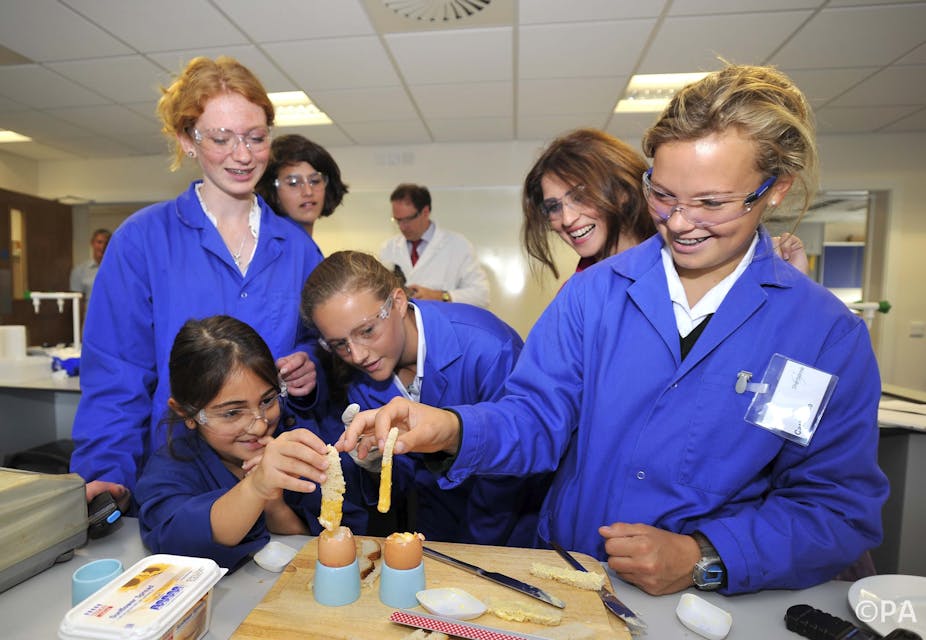The number of girls taking A-level physics has remained stagnant for the past 20 years or more, and the UK has the lowest proportion of female engineers in the EU. Progress on gender equality in science, technology, engineering and maths (STEM) is frustratingly slow.
And what’s even more worrying is that when questioned, Brits can’t think of current women scientists as role models. A recent YouGov poll of 3,000 people done for ScienceGrrl, a not-for-profit of which I am a director that advocates for more women in science careers, found one in ten named Isambard Kingdom Brunel – a male engineer – when asked to think of a famous women scientist. Only about half could actually name a female scientist and of those that did, 68% named Marie Curie, who died in 1934.
In a new report called Through Both Eyes also by ScienceGrrl, we set out the case for looking at the issue in light of the society we live in, and the legacy of inequalities between men and women.

Lack of progress isn’t due to a lack of attention or awareness. The Institute of Physics has compiled a series of comprehensive reports since 2004 and government frequently makes the economic case for diversity in science, technology, maths and engineering (STEM).
Deeply embedded cultural messages about women, attitudes, structures and norms manifest themselves as invisible hurdles that undermine girls’ participation and women’s progression in the workplace. These hurdles are invisible precisely because none of us knows what it looks like to live in an equal world.
Science capital in the family
We’ve explored what is known to propel somebody to choose a career in science. The literature is clear that there are three key factors. Liking STEM isn’t enough, it has to be relevant to a person’s interests and goals. They also need to feel confident they can succeed, and have access to “science capital” – the opportunity to gain knowledge and experience of STEM through personal networks.
People receive messages about themselves and the opportunities available to them from wider society, family and friends, the classroom and the workplace. We are all exposed to these messages and their balance is crucial to informing the choices we make.
Professor Louise Archer says her research shows it is: “harder for girls to balance or reconcile their interest in science with femininity” because STEM is seen to be for those who are “white, middle class, brainy and male”. A 2011 Ofsted report showed that by around 7-8 years old, girls and boys spoke about jobs as being “for men” or “for women”. Cordelia Fine, in her book Delusions of Gender suggests that children act as “gender detectives” from a much earlier age.
The “girls’ toys” that value physical perfection over adventure or intelligence, and the objectification of women in the media are just two examples of how the roles and capabilities of women are diminished in wider society.
Casual reliance on stereotypes leads to unconscious bias undermining all areas of girls’ lives. In STEM subjects, this is particularly true for confidence: girls perform worse in maths tests when their gender is made salient. This is known as “stereotype threat” – the phenomenon that performance can be impaired by awareness of lower expectations for your particular social group.
Stereotypes also affect expectations of those with influence in girls’ lives. Students get most of their careers advice from family members. But polling data from Engineers Week in 2013 showed that parents are steering their daughters away from careers in engineering, with 3% encouraging it as a career, compared to 12% for their sons.
Inspiring teachers
Progress will require a whole community approach. Schools also play an important role. Evidence from the Institute of Physics suggests that gender stereotypes undermine girls in the classroom.
But as Dr Vanessa Odgen, headteacher at Mulberry School for Girls, summarises: “girls’ uptake of science, technology and maths increases significantly when these subjects are taught by women who care passionately about STEM and when curriculum content promotes the achievements of women”. In short, when a whole school ethos means it is normal and expected for girls to succeed.
It is missing the point to say that girls aren’t “choosing” to study STEM. Many girls do not have real choice because of the low expectations placed on them and the lack of genuine opportunity. Girls are being kept out of rewarding careers.
We don’t need to change girls, we must place the responsibility on those with influence in our society. Showing the variety of directions STEM can lead, that it is creative and has social relevance it will appeal to a broader based talent pool, not just to more girls.

